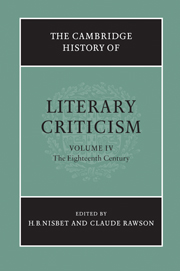Book contents
- Frontmatter
- INTRODUCTION: CRITICISM AND TRADITION
- GENRES
- 3 Poetry, 1660-1740
- 4 Poetry, after 1740
- 5 Drama, 1660-1740
- 6 Drama, after 1740
- 7 Prose fiction: France
- 8 Prose fiction: Great Britain
- 9 Prose fiction: Germany and the Netherlands
- 10 Historiography
- 11 Biography and autobiography
- 12 Criticism and the rise of periodical literature
- LANGUAGE AND STYLE
- THEMES AND MOVEMENTS
- LITERATURE AND OTHER DISCIPLINES
- Bibliography
- Index
- References
3 - Poetry, 1660-1740
from GENRES
Published online by Cambridge University Press: 28 March 2008
- Frontmatter
- INTRODUCTION: CRITICISM AND TRADITION
- GENRES
- 3 Poetry, 1660-1740
- 4 Poetry, after 1740
- 5 Drama, 1660-1740
- 6 Drama, after 1740
- 7 Prose fiction: France
- 8 Prose fiction: Great Britain
- 9 Prose fiction: Germany and the Netherlands
- 10 Historiography
- 11 Biography and autobiography
- 12 Criticism and the rise of periodical literature
- LANGUAGE AND STYLE
- THEMES AND MOVEMENTS
- LITERATURE AND OTHER DISCIPLINES
- Bibliography
- Index
- References
Summary
French: to 1700
Critic Learning flourish'd most in France
(Pope, Essay on Criticism)With one of those left-handed compliments that are often directed across the English Channel Dryden in his Dedication of the Aeneid, 1697, candidly concedes that, ‘impartially speaking, the French are as much better critics than the English, as they are worse poets’; he calls Le Bossu ‘the best of modern critics’, allows the critical writings of Boileau and Rapin to be ‘the greatest of this age’, and speaks respectfully of Bouhours and Saint-Évremond (Dryden, Of Dramatic Poesy, I, pp. 2.46, 199, II, pp. 56-8).
The Traité du poème éepique (1675) of René Le Bossu (1631-89) provided for its period the most authoritative modern treatise on what, it was generally agreed, was the highest genre of poetry. Le Bossu shares the neo-classical view that poetry was brought to perfection by the ancients, ‘therefore they who practise afterwards the same art are obliged to tread in their footsteps, and to search in their writings the foundation of them; for it is not just that new rules should destroy the authority of the old’ (Dryden, Of Dramatic Poesy, I, p. 246). Le Bossu's moderate tone, more judicious than judicial, appealed to the scientific temper of his age. The anonymous English translator of the Traité in 1695 said of him:
What he takes from Aristotle and Horace he explains, improves and refines: What is his own, though never so judicious and rational, he lays down not in a dogmatical, magisterial way, but by way of problem; and what he asserts with an air of confidence, though not his masters' thoughts, yet seem to be natural deductions from what they have wrote about it.
(Clark Boileau p. 250)- Type
- Chapter
- Information
- The Cambridge History of Literary Criticism , pp. 73 - 116Publisher: Cambridge University PressPrint publication year: 1997
References
- 2
- Cited by



